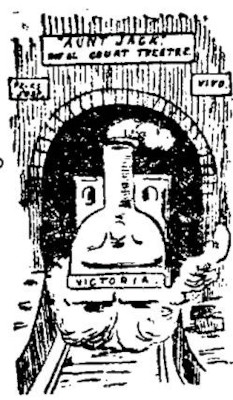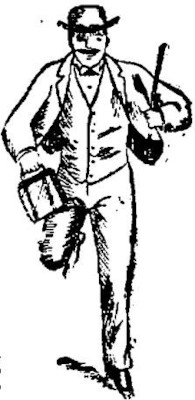This article has been transcribed from a copy of the Cardiff Times in the online collection of scanned Welsh newspapers 1804-1919 in the National Library of Wales, with grateful recognition of the free access accorded to all readers. Paragraph breaks have been introduced for easier reading.
Explanatory notes
This is an article written by someone who has very naïve ideas of what is involved in fine art, drama, or science. The fallacies are too obvious to mention. The reference to the Lancashire and Yorkshire railway line suggests that Samuel is once more located in the North.
Noel Paton: Sir Joseph Noel Paton (1821-1901) Scottish painter, illustrator and sculptor. His 'The Man with the muck rake' (1872), illustrates a scene from John Bunyan, Pilgrim’s Progress (1678) in which an old man is so intent in raking up things on the ground that he ignores Christ and his angels who are offering him a celestial crown. The notion that the painting was somehow hurried is not easy to comprehend.
the tortoise: in Aesop’s fable, 'The Hare and the Tortoise', which wins a race against a hare.
The illustration of a District Line train issuing from a tunnel towards Victoria, names the farce Aunt Jack by Ralph R. Lumley, then running at the Royal Court Theatre on Sloane Square. There are advertisements for Pear’s Soap and Vivo on the wall. For Samuel on advertising see 'Samuel on Pictorial Advertisements'.
The third illustration does not show the stout man described in the text. —— David Skilton

Some people are always in a hurry, and they transform their lives into perpetual whirlwinds, so eager are they to proceed at high pressure. The only time when these people cease being in a hurry is when the old reaper knocks at their door and tells them there is no further need for haste, for they have arrived at the end of the Journey. No sane man or woman is ever in a hurry to die. Even the oldest inhabitant, who has seen everything and done all man desires to do, clings tenaciously to the world, and disputes inch by inch the right of the fell sergeant to deprive him of hi[s] life.

Gone from life's hurry
Some people are always in a hurry, and they make life into a perpetual whirlwind. In fact, in such a hurry are these people that I often wonder they find time to eat or breathe.
Like teetotalism and procrastination[s] hurry is one of the extremes, and as such is a mistake. There are no extremes in life worth carrying out. The happy medium is the best thing to be guided by in all deeds and transactions, commercial or otherwise.
Hurry is always conducive to carelessness and neglect, and many a man has spoiled good work by being in too great a hurry to finish it.
I remember, years ago, being taken to see a painting by the romantic artist, Noel Paton. I looked at the picture very carefully, and was charmed by the working out of the subject generally. The centre figure, an old man in a hurry to accumulate wealth, stood out almost like a living reality. It was painted in the most painstaking manner and completely dwarfed a rather scamped figure of an angel in the back-ground.
So much so in fact that I remarked to the attendant that it hardly appeared to be up to the high standard reached by the remainder of the picture. 'You're [i]quite right, sir,' replied the man, 'that part of the picture was done in a hurry.'

In a hurry
Which proves to a demonstration that pictures painted in a hurry, even if they are not 'pot-boilers,' are not likely to be perfect works of art.
In this connection I have often thought that the 'time sketches' insisted upon by the Art Department of South Kensington were not favourable to the production of careful work on the part of the art students of the country. To my mind – and I have recently seen the selected 'time sketches' of the National Competition — they are conducive to scamped work either in oil or chalk. Pupils are apt to get tired of work which requires time and patience, and having done a rough drapery study in half an hour and gained a book or medal for it, they are not unlikely to fancy they can do other work in the same way, and to consider it a waste of time to take pains with it. Fatal fancy! It is an old and true saying that 'genius is the ability to take infinite pains,' and no real art work is ever done in a hurry.

Will he catch his train?
I have often had a picture shown me with the remark, 'I did this in three hours,' as if the mere fact that the artist had been in a hurry would be accepted by anyone as an excuse for a bad picture. The gentleman – very stout and puffy — who is always in a hurry to catch his train, is a well-known figure, and has ere this frequently given to the world a fatal warning against the danger of hurry. He occasionally supplies the papers with a sensational paragraph head 'Sudden death. In a hurry to catch his train.'
Such paragraphs tell how the gentleman hurried to catch a train (on a punctual line), and by so doing aggravated an attack of heart disease, and died as the result of his excitement and hurry. Thank goodness, being in a hurry does not often result so fatally. The Lancashire and Yorkshire line would appear to be the safest one for such passengers to travel on, for it is told of a man who was standing in a station where one of their trains was expected, that he set off to walk, without waiting for the train, because he was in a hurry.

Wise haste.
On the stage the results of being in a hurry are now and then humorous to a degree, and many an unrehearsed scene has been introduced by the efforts of the youthful historian, fearful lest he should miss his cue and be too late for his entrance. The sudden and unexpected appearance on the stage of an actor or actress is calculated to upset the equilibrium of the oldest and most hardened tragedian. On one occasion a 'super' with more ambition than discretion, rushed on too early in the middle of a scene with words – spoken in anything but an undertone – 'My lord the duke is wounded.' He was thoroughly satisfied with his effort, and was certain he had a future as an actor. But his satisfaction was rudely shaken when the star, staggered by the entrance of the 'super' before his time, said in an audible stage whisper, 'Not yet, you idiot, not yet.' Leading actors are apt to look with disfavour upon 'supers,' whose haste to gain dramatic fame results in their appearance on the stage before they are due there.
Hurry always shows itself in some form, and no work that it hastily done can hope to bear the light of criticism. The great men of the world did not do their work in a hurry; they laboured long and lovingly at their pet subjects, and drained the well of knowledge by their patient and laborious toil. They knew the danger of haste.
The scientists who achieve fame are not in a hurry – their discoveries are the result of centuries of thought and labour. To them haste ls as fatal as to the man with heart disease. They plod on slowly but surely, and, as did the tortoise; they eventually win the race of accuracy and land themselves in safety before their hurrying but unreliable rivals. Therefore let all people who desire to do good work, to be useful citizens and to lead rational lives, avoid hurry. It is the evil of the age in which we live when men desire to amass riches without labour, and all men are striving to outstrip their neighbours in the race of life.
Last modified 19 April 2022